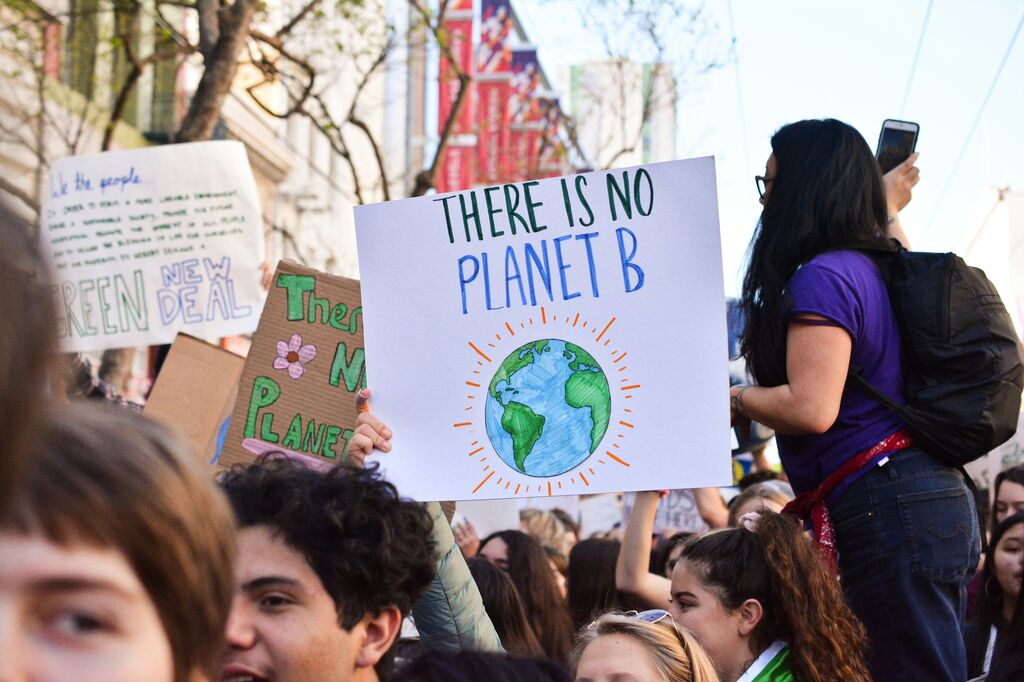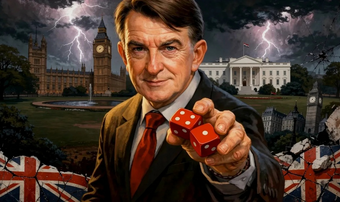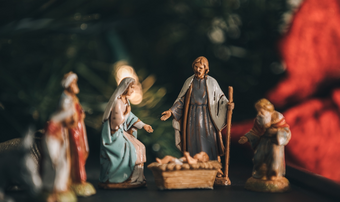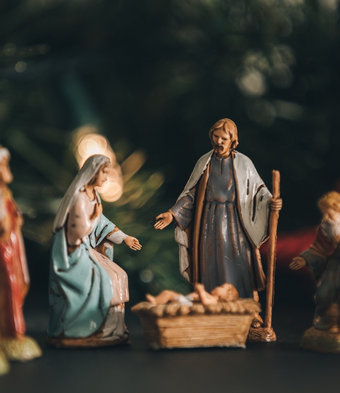Sustainability without sensationalism

“Adults keep saying we owe it to the young people, to give them hope, but I don’t want your hope. I don’t want you to be hopeful. I want you to panic. I want you to feel the fear I feel every day. I want you to act. I want you to act as you would in a crisis. I want you to act as if the house is on fire, because it is.”
That’s what the teenage climate activist Greta Thunberg said to an assortment of world leaders at the World Economic Forum in Davos in 2019. Her words were not only deliberately provocative, but really quite revealing about the way people, and especially young people, are mentally processing what is happening to our planet.
Three years on, as another COP conference comes and goes (this now the 27th annual summit), and with seemingly endless disruption to civilians being caused by one activist organisation after another, from Extinction Rebellion to Insulate Britain to the latest incarnation, Just Stop Oil, how might we reflect as Christians on what is going on?
Climate change is not (and continues not to be) an issue CARE develops policy in, although we heartily commend the work of some other Christian organisations working directly in this area, such as A Rocha. But it would be remiss of us - as an organisation looking to provide a distinct Christian voice in UK politics - to completely ignore one of the chief political issues of our day and not examine it through a Christian lens.
What is the better story we can tell for a world split between not caring about ‘Mother Nature’ and hysteria about impending extinction events?
In the Bible’s macro-narrative, which explains life, the universe and everything in it, mankind has always had a responsibility for stewarding the earth. The rule over the earth man has been granted is not just a gift of God, it is a part of God’s good creation. We read in Genesis 2:
"The Lord God took the man and put him in the Garden of Eden to work it and take care of it."
Tending to the earth has always been part of God’s good plan for humanity. Mankind’s employment history begins with a gardener. (So much for the kind of attitude which says green concerns are irrelevant to us as Christians!)
But although God instructed mankind to ‘fill the earth and subdue it’ (Genesis 1: 28), it was not to be an exploitative rule where we could do whatever we liked. Man may have been given dominion, but it was never supposed to be domination. The ultimate rule belongs to God alone as its Creator. As the Psalmist writes: “The earth is the Lord’s and everything in it.” (Psalm 24: 1). The God who has his eye on the sparrow and clothes the flowers of the field cares about all he has made, and we as humans are to be stewards of creation, not abusers of it.
This is something which our secular climate activists can only partially glimpse: they rightly say that the earth does not belong to us, and that we must steward it for future generations. But we do not just steward the earth for them, but for the Creator who gave it to us in the first place.
The theologian John Stott put it like this:
“If we think of the earth as a kingdom, then we are not kings ruling our own territory, but viceroys ruling it on the king’s behalf, since the king has not abdicated his throne. Or if we think of earth as a country estate, then we are not the landowners, but the bailiffs who manage and farm it on the owner’s behalf. God makes us, in the most literal sense, ‘caretakers’ of his property.”
It is within this context that man-made climate change matters. Global temperatures have risen by 1.1C since pre-industrial times, with greenhouse gas emissions from coal, oil and gas still increasing. In the first half of this year, France and Germany recorded around 7x more land burnt than the average. Extreme floods in Pakistan have led to around a third of the country being underwater. And the rains have failed in East Africa for the 5th consecutive year. Although it is always difficult to point to any single event and lay the finger of blame at climate change, climate change is making such events more severe and more frequent, and the link between man’s activity and increases in global temperature is at this point well established.
Within God’s story, it is no surprise to see creation out of kilter. When mankind fell, creation fell with it, and all the relationships in Genesis 1-3, including that between man and the world, were broken. After the fall, God spoke to Adam and Eve, saying:
“Cursed is the ground because of you; Through painful toil you will eat food from it all the days of your life. It will produce thorns and thistles for you, And you will eat the plants of the field.”
A world where man and nature are in conflict is to be expected in a world choking under the curse of the Fall; or as Paul puts it “We know that the whole creation has been groaning as in the pains of childbirth right up to the present time.” (Romans 8:22)
But the effects of this conflict are far-reaching. The droughts in East Africa have led to 22 million people being at risk of severe hunger, according to the UN’s World Food Programme. More than 4 million acres of crops have been destroyed in Pakistan. Perhaps most concerning of all is the projected rise in sea levels, which puts large numbers of people across the world at a risk of severe flooding and some areas becoming uninhabitable. As we look to love both God and neighbour (including those on the other side of the world), it seems inevitable that those who will be hit hardest are those who are already the most disadvantaged in developing nations.
It is clear that something has to be done, and that as Christians, we are called to have a voice in the debate, as stewards of the King. And there has been an enormous shift in attitudes across the globe during the last 50 years on the environment, in which the UK has played a leading role. Under Theresa May’s leadership, the UK became the first major economy to enshrine in law a commitment to reaching net zero greenhouse gas emissions by 2050. The UK has nearly halved its fresh emissions in the last 20 years, to the extent that they now resemble the levels seen in the mid-19th century. More than 140 countries have now pledged to reach net zero, and at COP26 last year, there was the first ever commitment to phase out the use of coal.
Of course, there will always be debates over whether the rate of progress is fast enough, and it is only right that governments around the world are held accountable for the promises they have made. Setting a target is not the same as achieving it in reality, as we were reminded when the 2009 pledge by developed countries to give $100bn/year to developing countries by 2020 was missed (the revised target is next year). We also cannot neglect our own personal responsibility, whether that be reducing emissions in the way we travel, buying energy-efficient products, or simply turning off our sockets at the wall. It is right that as Christians we care about all these things.
But as much as our world leaders ought to be held to account, the shrill nature of some activists and the levels of fear some are looking to instill are doing real damage. In a subtle shift in language, we don’t always hear so much about ‘climate change’ but a ‘climate emergency’ or ‘climate crisis’. The activist group Just Stop Oil have said that “New oil and gas is an act of genocide”; others talk of ‘global extinction’.
To return to the words of Greta Thunberg, she wants “you to panic. [She wants] you to feel the fear [she feels] every day.”
Such apocalyptic language is not part of the better story God gives us. Just listen to the words of Jesus in Matthew 6:
“Therefore I tell you, do not worry about your life, what you will eat or drink; or about your body, what you will wear. Is not life more than food, and the body more than clothes? Look at the birds of the air; they do not sow or reap or store away in barns, and yet your heavenly Father feeds them. Are you not much more valuable than they?”
As Christians, we do not believe that the world will end until the Lord Jesus himself comes back and puts everything right. Greta Thunberg may not believe in ‘hope’, but we do. The secular world can talk about human extinction, but we live in a better story which tells us of a God who loves us, who looks after us, and who not just creates us but sustains us and rescues us. That does not excuse us from our responsibility to steward the earth, but it does mean that we should not give in to despair.
The Collins Dictionary recently announced their word of the year for 2022: “permacrisis”.
It is perhaps no surprise after the last couple of years: a global pandemic and war in Ukraine have placed many people’s mental health under immense pressure.
But in God’s better story, Jesus Christ has already defeated the curse of the fall and has crushed the power of evil. The thorns of Genesis 3 crowned his brow as he died on the cross, and death itself was turned backwards as he rose again from the tomb.
And one day, this age will come to an end, not as a result of carbon emissions, but when the true King comes back to the earth as both Rescuer and Judge, and puts right everything that has gone wrong, including what has gone wrong with our planet.
In just a few weeks time, many of us will be singing Isaac Watts’ great Advent hymn, ‘Joy to the World’. Its third verse gives a glimpse of this hope:
“No more let sins and sorrows grow Nor thorns infest the ground; He comes to make his blessings flow Far as the curse is found.”
Our world will be renewed, as we see a ‘new heaven and a new earth’ (Revelation 21:1). Creation will no longer be groaning but be in harmony, when ‘the wolf will lie down with the lamb’ (Isaiah 11:6). And we will no longer need to worry about our natural resources, on a day when “New wine will drip from the mountains and flow from all the hills.” (Amos 9:14).
God’s new creation is coming; in Jesus’ resurrection it has already begun. Adam, the first man, was placed in the first creation as a gardener to tend the ground. Jesus, the new and better Adam, has been raised to life again, the firstfruits in the new creation. What was he mistaken for? A gardener (John 20:15).
Looking after God’s creation does matter. But we do it not as those who have no hope. We do it as those looking forward to the day when the Lord of the Garden returns.






